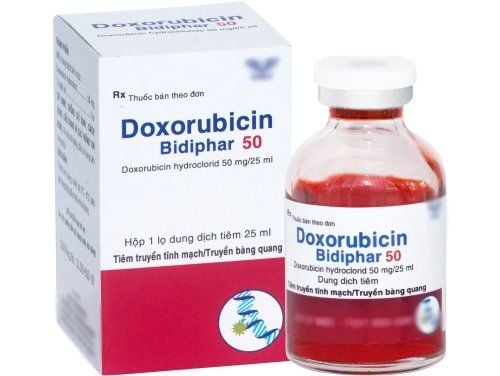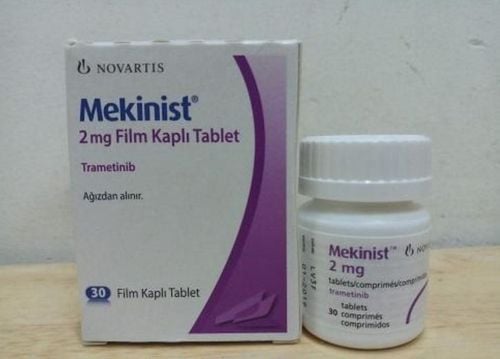This is an automatically translated article.
Avastin medicine has the main ingredient bevacizumab 400mg/16ml. This is a prescription drug used to treat cancer. Let's find out useful information about Avastin through the article below.
1. What is Avastin?
The active ingredient bevacizumab in Avastin is actually a man-made antibody produced by recombinant DNA technology. It has the ability to neutralize the biological activity of VEGF, known as human endothelial growth factor. Thereby, reducing blood flow to nourish the tumor. The result is slowing tumor growth and prolonging the life of cancer patients.Avastin is prescribed by doctors in cases such as:
Patients with metastatic colon or rectal cancer: often used in combination with fluoropyrimidine. Patients with metastatic or recurrent breast cancer: often used in combination regimens with the taxel group. Patients with non-small cell lung cancer: used in combination with platinum-based chemotherapy. Patients with advanced renal cell cancer: used for the first-line treatment of patients with advanced renal cell cancer in combination with interferon alfa-2a. In addition, Avastin is also indicated for patients with epithelial ovarian cancer, cervical cancer and primary peritoneal cancer. Starting in 2004, Avastin is also being researched and tested to treat patients with eye-related conditions such as macular degeneration, retinopathy of prematurity, and diabetic retinopathy. However, these indications still do not have enough database to officially publish and apply widely.
2. Dosage and how to take Avastin
Avastin is an injectable drug, patients only use it when prescribed by a doctor and with support from medical staff. The drug is diluted with 0.9% sodium chloride solution to achieve a concentration of 1.4 - 16.5mg/ml. The most common route of administration for Avastin is intravenous infusion.
Dosage of Avastin is recommended as follows:
For indications for treatment of metastatic rectal cancer: first-line treatment with a dose of 5mg/kg every 2 weeks or a dose of 7.5mg/kg, 3 once a week. Second-line treatment with a dose of 10mg/kg every 2 weeks or a dose of 15mg/kg every 3 weeks. For indications for treatment of non-small cell lung cancer: 7.5mg/kg, once every 3 weeks when combined with cisplatin. Use a dose of 15mg/kg, once every 3 weeks when combined with carboplatin. For indications for breast cancer treatment: Use dose 10mg/kg, once every 2 weeks or dose 15mg/kg, once every 3 weeks. Avastin is usually given intravenously over 90 minutes, if the patient responds well, it can be shortened to 60 minutes or 30 minutes at subsequent use.
3. Precautions for treatment with Avastin
Avastin has a side effect that increases the risk of gastrointestinal perforation. Therefore, caution should be taken when using Avastin for patients with inflammatory diseases of the gastrointestinal tract such as peptic ulcer, diverticulitis, colitis,...
Avastin also increases the possibility of bleeding and slow the healing time of surgical wounds or stitches. If the condition is severe, discontinuation of the drug should be considered.
When using Avastin to treat patients with non-small cell lung cancer, the side effect of hemoptysis has been reported in a few cases.
Avastin drug has the ability to increase blood pressure of treated patients. Therefore, blood pressure should be regularly monitored to prevent excessive hypertension in Avastin users.
In addition, caution should be exercised when Avastin is administered to patients with congestive heart failure, thrombotic disease, and leukopenia.
Do not use Avastin in patients with a history of allergy to recombinant artificial antibodies or any of its ingredients.
Avastin is contraindicated in patients with untreated CNS metastases.
Absolutely do not dilute Avastin with glucose solution or dextrose solution because it is incompatible with these solutions.
4. Avastin side effects
Patients treated with Avastin may experience symptoms such as
Ease of infection, abscess, infection Anemia Headache Dehydration Peripheral nerve disorders Syncope Hypertension Diarrhea, abdominal pain Muscle weakness Asthenia, fatigue Heart arrhythmia Increased tear production
5. Avastin drug storage
Avastin medicine is stored in the refrigerator with a temperature of 2 - 8 degrees Celsius. Do not let the medicine freeze. Do not shake the vial.
Because the active ingredient in A vastin is sensitive to light, keep the medicine in its original box, away from direct light.
Avastin does not contain preservatives, so during the preparation and use of the drug, it is necessary to ensure aseptic hygiene to avoid bacteria that can enter the drug solution.
Avastin should be used immediately after preparation. Prepared drugs that are not used immediately should be stored at 2 - 8 degrees Celsius and used within 24 hours to ensure the stability of the drug.













